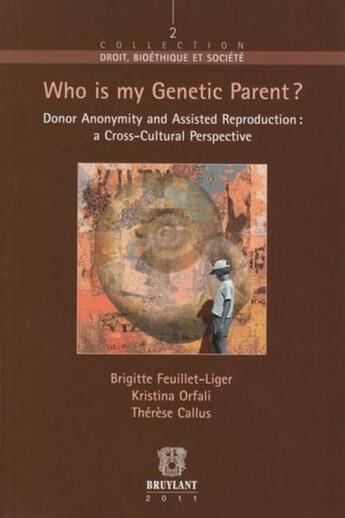Résumé:
Titre: Who is my Genetic Parent ?
Theme1: Droit - Droit international et étranger - Droit étranger Theme2:
Résumé: If over the last couple of decades, advances in reproductive medicine have helped many couples who are unable to conceive naturally, the initial aim was generally to favour... Voir plus
Titre: Who is my Genetic Parent ?
Theme1: Droit - Droit international et étranger - Droit étranger Theme2:
Résumé: If over the last couple of decades, advances in reproductive medicine have helped many couples who are unable to conceive naturally, the initial aim was generally to favour conception using the couple's own gametes. However, the successive developments of artificial insemination and in vitro fertilisation (IVF) have provided us with alternative ways to conceive which no longer rely upon biological parentage. Today, a couple can conceive a child with gametes from a third party and can even adopt an embryo conceived by another couple. In such cases, it is necessary to reconcile the interests of all concerned (the infertile couple, the gamete or embryo donors and the child). Certain countries have adopted laws which impose donor anonymity which deny the child of any information on the donor, in the belief that this best assures the child's welfare. However, such a social choice is questioned by the increasing demand by children born through artificial insemination by donor, to remove anonymity. Such claims have been supported in certain countries who have adopted a principle of genetic transparency.
This book is the fruit of rich debate and reflection between lawyers, doctors, psychoanalysts and sociologists during the first Workshop of the International Academic Network on Bioethics (IANB). Through a comparative approach, the chapters examine how the question of anonymity in sixteen different countries is dealt with - anonymity which may be absolute, relative or even non-existent. Despite diversity between legal systems, one thing is sure: the question of abolishing anonymity is one of immediate importance. The answer either unites or divides. But could it be any other way on a subject which goes to the heart of our social perceptions on individual identity, parentage and parenthood ?
Created in 2007, the IANB's objective is to promote research through collaboration between academic representatives from different countries and cultures, all specialists in the field of biomedicine. Based upon a comparative approach of different legal systems, the work of the group analyses social choices in biomedicine through the different lenses of ethics, anthropology, philosophy and sociology. In this way, their research feeds into the elaboration and development of international regulation of biomedical practices and incidentally on achieving the balance between the respect for different cultures and the move towards a certain universality, supporting the harmonisation of laws. This new collection will therefore be indispensable for anyone seeking to understand the social implications of bioethics.
Brigitte Feuillet-Liger is Professor at the Université de Rennes, France, member of L'Institut Universitaire de France, director of the CRJO and president of the International Academic Network on Bioethics.
Kristina Orfali is Associate Clinical Professor of Bioethics (Pediatrics) at Columbia University, New York ; she is also a Faculty Associate at the Institute for Social and Economic Research and Policy (ISERP).
Dr. Thérèse Callus is Senior Lecturer in Law at the University of Reading, UK. Contributors: Penelope AGALLOPOULOU, Amel AOUIJ-MRAD, Stéphane BAUZON, Thérèse CALLUS, Maria-Claudia CRESPO-BRAUNER, Guilherme DE OLIVIERA et Rafael REIS, Geneviève DELAISI DE PARSEVAL, Brigitte FEUILLET-LIGER, René FRYDMAN, Françoise FURKEL, Ryuichi IDA, Jean-Marie KUNSTMANN, Dominique MANAI, Dominique MEHL, Kristina ORFALI, Verónica SAN JULIAN, Judit SANDOR, Geneviève SCHAMPS et Marie-Noëlle DERESE, JG SIJMONS, Claude SUREAU Cover by Zsolt SANDOR








